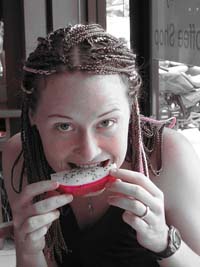Evelyn Waugh: The Loved One
I didn't include this book on my "Currently Reading" section of my blog because The Loved One has been my bath book for the last few weeks now. It's small and cheap and when the pages got all wrinkly I didn't even mind. Now my bath book is Jock of the Bushveld, an old South Africa folk story which continues to shock and amaze me with it's racist slurs and hokey colloquialisms. I'm enjoying it though - it's like visiting another time and place.
Back to Waugh...
The Loved One (published in 1948) is loosely based on the Forrest Lawn graveyard in the Hollywood Hills (which apparently fascinated Waugh). Waugh is a satirist and in this book he took on a great subject; death and dying in Western culture. He manages to mock the American nouveau-riche and the almost grotesque extremes people go to to avoid facing mortality. The book is funny and insightful and irreverent. The main character, Dennis Barlow, is a transplanted Brit living and working in Hollywood. His job as a pet mortician (at the Happier Hunting Grounds Pet Cemetery) has shamed the other Brits in the area who feel they have a certain reputation to upkeep. The woman he falls in love with, Aimee Thanatogenos is the makeup woman at the Whispering Glades Funeral Home and works closely with Mr. Joyboy who, in his love for Aimee, makes sure that every body who comes her way has a beautifully sculpted smile on its face. The bodies are referred to as "loved ones", thus the novel's title.
The writing is witty, charming and often sarcastic. No subject escapes Waugh's sardonic sword and he wields it artfully. It's a quick and easy read but worth it.

